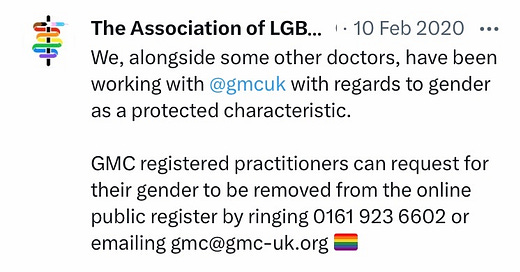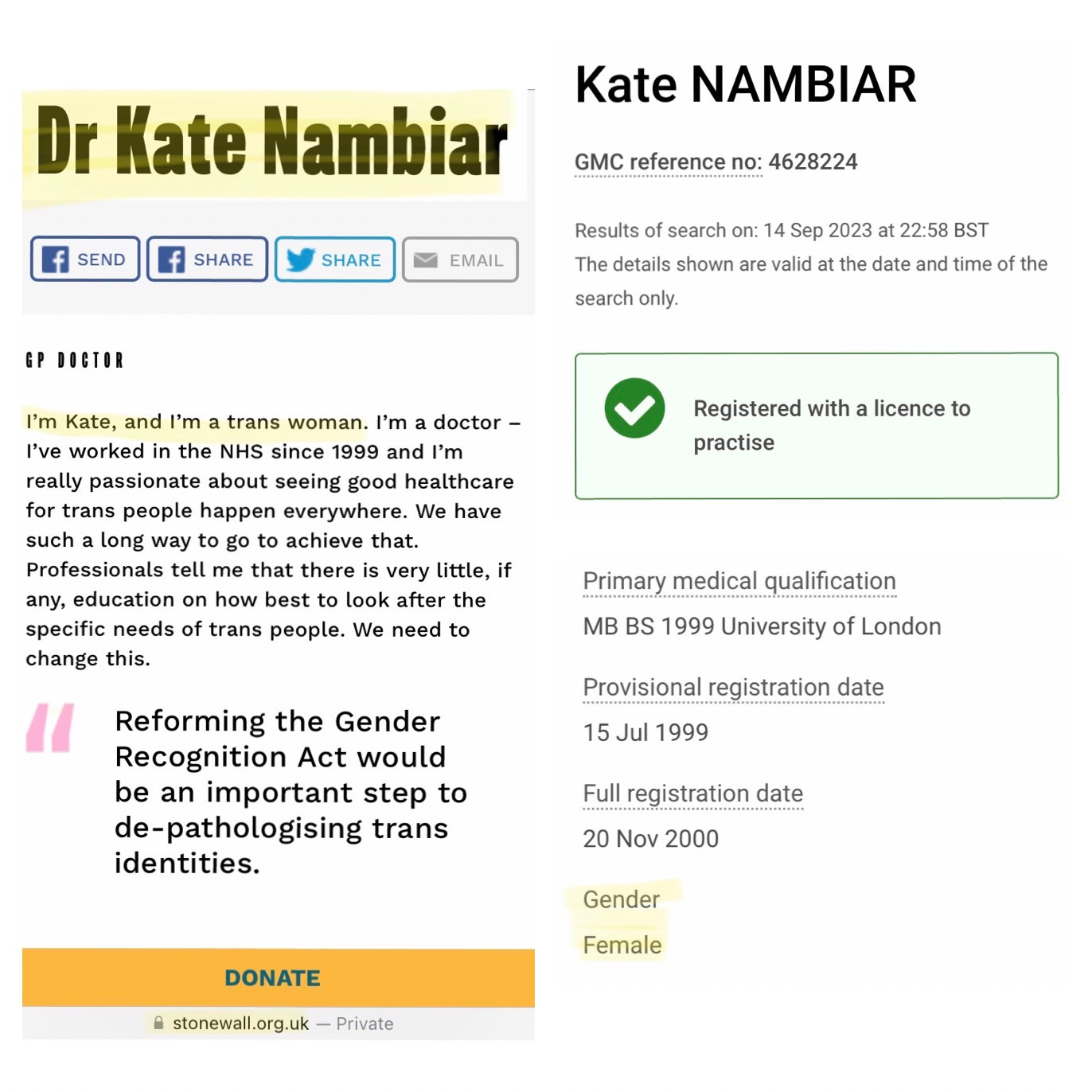Doctor, No
The GMC is appeasing activists by allowing doctors to hide their sex from patients
The UK’s influential Association of LGBTQ+ Doctors and Dentists (GLADD) has been relentlessly lobbying for changes to the NHS in the last few years. Previously, we described how GLADD’s charter asking doctors and medical students to pledge that they will only ‘affirm patients’ gender identity’ has been signed by 80% of UK medical school leads, which is alarming. Another contentious area of GLADD’s activism is the ‘Hello My Name Is Gender Badges’ initiative, in which they advocate the widespread use of pronouns on NHS staff’s ID badges.
However, GLADD’s most alarming surreptitious activism is their nationwide implementation of a ‘Genderless Medical Register’. In 2020, GLADD lobbied the General Medical Council for doctors to be able to change or remove their Male or Female marker on the publicly searchable GMC Register. Astoundingly, the GMC seems to have enacted this change without any consultation with the public or, presumably, the government.
In the Association for the Study of Medical Education’s (ASME’s) June 2022 ‘showcase’ of doctors’ work for Pride month, GLADD Co-chair Dr Duncan McGregor highlights on p.13 that he lobbied for and achieved the ‘removal of gender from the public medical register’. He goes on to explain that ‘until recently, gender was a mandatory field in a doctor’s online public medical register on the General Medical Council website, but this can now be removed, protecting trans & non-binary doctors from being publicly outed online in this way’.
However, this change fails to respect patients' rights to know if they will receive same-sex care. Neglecting this right may lead to legal challenges from patients who feel their beliefs, privacy and dignity are being violated, particularly those who have experienced trauma. They should not be subject to such manipulation by the General Medical Council when accessing NHS services. Doctors being able to hide their biological sex from patients on the GMC’s public register is a troubling development.
There are two known examples so far of ‘non-binary’ doctors having removed their gender/sex marker from the GMC register (the GMC is conflating these terms). One of these doctors is Dr Katie McDowell, who is GLADD’s Trans Rep and also a trustee of the charity Mermaids. The other is Dr Jo Smith, a gender activist who is part of the ‘Queerying the Curriculum collective’, which Dr Smith describes in ASME’s 2022 Pride booklet (p.18) as being ‘a collective of queer and trans clinicians who provide teaching to undergraduate and postgraduate audiences on a wide range of LGBTQ+ issues’.
Even more shocking is the fact that there have been four instances where doctors identifying as trans women were listed as female on the General Medical Council's public register upon their request. Considering that the general population will interpret ‘gender’ to mean ‘biological sex’, this is a major breach of public trust which negates patients’ informed consent. It’s hard to see how any of it will stand up to legal scrutiny.
One of these doctors is Dr Kamilla Kamaruddin, a trans-identified male GP who delivers regular teaching sessions about ‘LGBTQ+ Healthcare’ to medical students and junior doctors. According to this introduction as a speaker at the Royal College of GPs’ 2023 Conference, Dr Kamaruddin also works at the Tavistock Gender Identity Clinic and has won awards from the Royal College of GPs and Pink News. Dr Kamaruddin is also Clinical Lead of the East of England Gender Service, which is a new national pilot that was launched by the Nottingham Centre for Transgender Health Network (NCTH) in June 2021 for people who live in the region.
In Dr Kamaruddin’s 2017 article What it’s like to be a transgender patient and a GP in the British Journal of General Practice, the doctor states ‘A lot of my patients were quite conservative — many female patients wore long clothes, or the hijab — but they allowed me to examine them despite my change. In fact, after my transition, they even allowed me to perform more intimate examinations that they did not let me to do when I was a male GP’.
This is disturbing, and suggests that the same conservative, religious patients who had already declined care from this doctor on the grounds of being male had been asked again after Dr Kamaruddin had declared a new gender identity. This implies that the patients may have felt coerced to say yes, making the level of free consent gained from the patients in these circumstances dubious. It depends upon patients having to accept the premise that it is possible to change biological sex, which suggests a future legal battle around the protected characteristic of belief in 2010’s Equality Act.
As noted in Maya Forstater’s article Trans healthcare professionals and patient consent of September 2020, Dr Kamaruddin was listed on their GP practice’s website as ‘female’ at that time. So there seems to have been obfuscation of some doctors’ biological sex for quite some time from NHS leaders, as GLADD persuaded the General Medical Council to remove or change doctors’ Male/Female marker on the public GMC register in early 2020.
Another trans-identified male doctor who is listed with ‘Gender: Female’ on the GMC register is Dr Christine Mimnagh, who is Clinical Lead at the Merseyside adult gender service CMAGIC and is also a GP.
In Kathleen Stock’s recent article for Unherd, she describes how Dr Mimnagh has compared a holistic approach to treating a child’s self-diagnosed ‘gender identity’ to disbelieving a report of sexual abuse. The article quotes Dr Mimnagh as going on to say ‘There is a difference between affirmation and dismissal and with everyone who is trans, affirmation is kind of the name of the game; you can’t deny people’s reality just because their reality is different from yours.’
From this we can see that the refusal to acknowledge a shared reality and concept of truth is at the crux of these issues in the NHS. Accepting someone’s self-ID of their gender/sex in an NHS context, whether they are a clinical practitioner or patient, leads to negligence and a lack of informed consent for patients. The NHS wouldn't allow an unqualified individual to perform operations if they merely identified as a surgeon. Neither would NHS clinicians affirm a patient’s identity who believed that they were Napoleon. So the willingness of the GMC and other medical organisations to put aside material reality in the name of someone’s beliefs seems to be restricted to those identifying as the opposite sex or ‘non-binary’.
Two further trans-identified male doctors listed as female on the General Medical Council’s public register are Dr Sameera Mahamud Jahagirdar and Dr Kate Nambiar. These are just some known examples so far, which implies that there will be many more doctors who have followed GLADD’s invitation to contact the General Medical Council with requests to remove or change their Male/Female marker on the GMC’s public register.
If a member of the public is given a doctor’s name for an appointment and searches for them on the General Medical Council’s online public register, it is now clear that the ‘Gender’ listed by the GMC will not always reflect the doctor’s biological sex. The average member of the public would interpret the word gender as being a synonym for sex, however the GMC has made an underhand switch to instead use the word gender to mean gender identity - a scandal of which the public need to be made aware.
If you're concerned about this issue, there are several actions you can take. Firstly, consider writing to your MP to express your concerns. You can find their contact details by searching here. Additionally, you can contact the General Medical Council (GMC) to raise concerns about their use of 'gender' to refer to 'gender identity' instead of 'sex' on the public register for doctors. You can reach them by emailing feedback@gmc-uk.org or standards@gmc-uk.org
N.b. Since this article was published, the General Medical Council has provided FOI responses in which they confirm that they have granted doctors’ requests to edit their entries on the public register as follows:
The GMC has removed the gender of 45 doctors from the public register
The GMC has agreed to represent 54 male doctors as female on the register
The GMC has agreed to represent 24 female doctors as male on the register
The GMC also stated ‘We do not record the sex of doctors, so we do not hold this information’. Only doctors’ gender, which they are treating to mean ‘gender identity’. Please also see Alan Henness’ article on his FOI responses from the GMC here.















"A lot of my patients were quite conservative — many female patients wore long clothes, or the hijab — but they allowed me to examine them despite my change. In fact, after my transition, they even allowed me to perform more intimate examinations that they did not let me to do when I was a male GP’. "
I could be wrong but I suspect that this is not a demographic with a high degree of information or awareness of the facts about transgenderism and the absolute impossibility of 'changing sex'. I wonder how many of these women would be horrified to be told they had just been intimately examined examined by someone who is in fact STILL a male GP.
This seems to me to qualify as some kind of assault by deception. At the very least it should be possible to claim that the women's Equality Act rights to their religious belief had been disregarded.
The recent ruling from the Court of Sessions draws a very clear line between those in possession of a GRC and those merely claiming a transgender 'identity'. I wonder if any of these men have a GRC?
I know these people struggle to tell the difference between a horse and a chair so it isn't surprising that they cannot tell the difference between a male and a female body. But for most people, unless they are a coma patient, it is going to be pretty obvious whether it is a male or female regardless of what a database says.